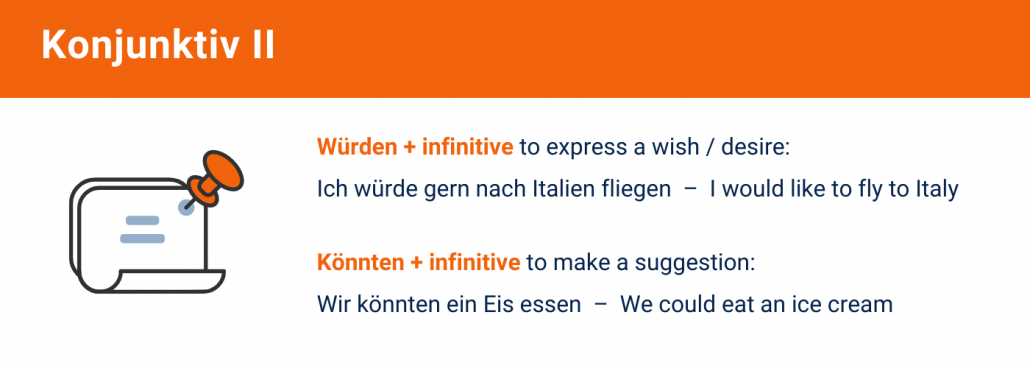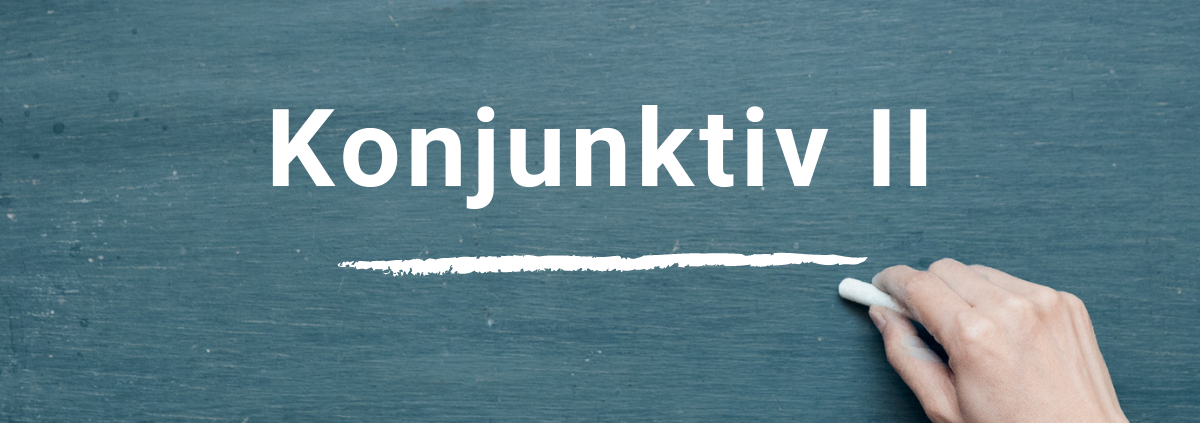The German Subjunctive II (Konjunktiv II) explained
Here is a guide to when and how to use the Konjunktiv II in German. Learn and start practicing with us.
Are you struggling to build sentences using the German Subjunktiv II? Don’t worry, we have got you covered. In this article we will teach you when to use the Konjunktiv II and how to build it.
First of all, you must remember that the Konjunktiv II is used to talk about hypothetical situations. It allows us to talk about our dreams and desires, but also to make suggestions or to soften a request.

Here are a few examples:
• Hätte ich Zeit, würde ich viele Bücher lesen. – If I had time, I would read a lot of books.
• Wir könnten ins Kino gehen – We could go to the cinema. (suggestion)
• Ich hätte gern ein Stück Torte – I would like a piece of cake. (kind request)
There are two ways to build the Konjunktiv II
1. If we want to build the Konjunktiv II of a verb, we start with the stem used in the Präteritum. Then we add the same endings used for the Präteritum.
Ich kaufte (Präteritum) –> ich kaufte – du kauftest – er kaufte – wir kauften – ihr kauftet – sie kauften (Konjunktiv II)
As you may notice, the Konjunktiv II of weak verbs (like kaufen or sagen) ends up looking exactly like their Präteritum form. Strong verbs and mixed verbs, instead, add an Umlaut (where possible) to their Präteritum stem.
geben – gab – ich gäbe
bringen – brachte – ich brächte
However, for the majority of verbs, we usually don’t build the Konjuktiv II in this way. It is preferable to follow another structure instead (see point 2 below).
2. We can also build the Konjunktiv II with the auxiliary “werden”. We just need to learn its subjunctive form:
Ich würde
Du würdest
Er würde
Wir würden
Ihr würdet
Sie würden
Here is how most verbs build the Konjunktiv II:
Würden + infinitive
Ich würde gern eine Pizza essen. – I would like to eat a pizza
Sarah würde gern einen Hund adoptieren. – Sarah would like to adopt a dog.
Was würdest machen, wenn du viel Geld hättest? – What would you do if you had a lot of money?
Some verbs don’t build the Konjunktiv II with “würden”
When it comes to auxiliary (haben and sein) and modal verbs, we should use the first form. That means that in these cases we do not use “würde”. Please note that “wollen” and “sollen” do not want the Umlaut.
• Ich hätte
• Ich wäre
• Ich möchte – ich könnte – ich dürfte – ich müsste – ich wollte – ich sollte
There are also a few irregular verbs, whose Konjunktiv II is often built starting from the Präteritum. These are:
• gehen – ging –> ich ginge
• kommen – kam –> ich käme
• wissen – wusste –> ich wüsste
• finden – fande –> ich fände
• lassen – ließ –> ich ließe
• schlafen – schlief –> ich schliefe
Konjunktiv II in the past
So far so good… now let’s move on the past form. There is nothing to be scared of, if you remember how to build the Perfekt. Instead of using the present form of the auxiliaries haben and sein, you just have to switch to their subjunctive form. For instance:
Perfekt: Ich habe mein Zimmer aufgeräumt. – I tidied up my room.
Konjunkitv II – past tense: Ich hätte mein Zimmer aufgeräumt, (wenn ich Zeit gehabt hätte). – I would have tidied up my room, (if I had had time).
Perfekt: Ich bin nach Paris geflogen. – I flew to Paris.
Konjunkitv II – past tense: Ich wäre nach Paris geflogen. – I would have flown to Paris.
Things get a little more complicated when you have to build the past tense of the Konjunktiv II with modals. In this case, you should use the following structure:
Hätten + infinitive + infinitive of the modal verb (hätten + double infinitive)
Ich hätte das Abendessen kochen müssen. – I should have cooked dinner.
Peter hätte nach Österreich fahren können. – Peter could have travelled to Austria.
It is important to remember that we should always use the auxiliary “haben”, even if we would have used “sein” for the Perfekt (see: “er ist gefahren” vs “er hätte fahren können”).
Let’s practice!
Was würdest du machen, wenn du reich wärst? – What would you do if you were rich?
Ich würde einen Urlaub auf den Malediven machen – I would go on vacation to the Maldives
Ich würde ein Haus am Meer kaufen – I would buy a house by the see
Und du? Was würdest du machen? – And you? What would you do?
Try to list at least three things that you would do if you were rich.
Was würdest du tun, wenn du keine Angst hättest? – What would you do if you had no fear?
Ich würde in eine neue Stadt umziehen. – I would move to a new city.
Ich würde Bungee Jumping ausprobieren. – I would try bungee jumping.
Ich würde vor Publikum singen – I would sing in front of an audience.
Now try to list three things you would do if you had no fear.
Would you like to keep learning German?
Berlino Schule offers German courses from A1 to C1. Our certified teachers are waiting for you!
Berlino Schule has the best quality-price ratio (check the reviews online, 4.9/5 on Google and Facebook). Click here to access the calendar and reserve your place by simply sending an email to info@berlinoschule.com.
Our contacts
Gryphiusstraße 23, 10245 Berlin-Friedrichshain
+49 030 36465765
info@berlinoschule.com




Lascia un Commento
Vuoi partecipare alla discussione?Sentitevi liberi di contribuire!